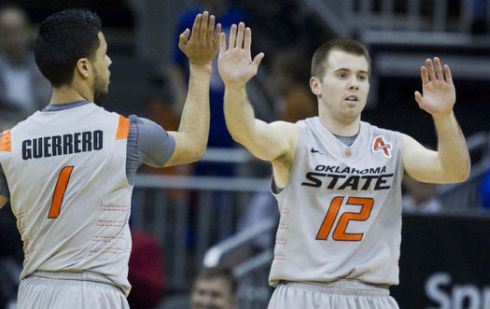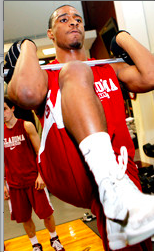The Final Game: How a Star and a Walk-On Finished Their Careers in Kansas City
Posted by dnspewak on March 28th, 2012Danny Spewak is a Big 12 Microsite writer. He wrote this piece after covering the first two days of the Big 12 Tournament in Kansas City. You can follow him on Twitter @dspewak.
One senior exits the court at the Sprint Center with 53 seconds remaining, walking gingerly toward his coach as an entire arena stands to applaud his four years of contributions. He will be remembered in college for playing more minutes than any player in program history — 4,322 to be exact. He is a former high school legend who set a state record for most points in a single season, once totaling 61 points in a single contest. He is a star and always will be. A name nobody around his parts will or could ever forget.
A night earlier, another senior enters the court at the Sprint Center with 21.2 seconds remaining on the clock, jogging toward his teammates as a few supporters in the stands politely applaud his four years of contributions. He will be remembered in college for hardly ever playing any minutes — 111 to be exact. He is a former high school point guard who won a 2008 state title without even scoring five points per game for his team, a man who has never been a star and never will be. A name most people around his parts will immediately forget.
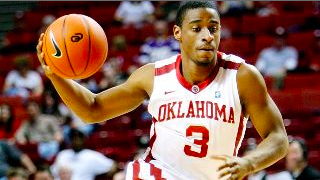
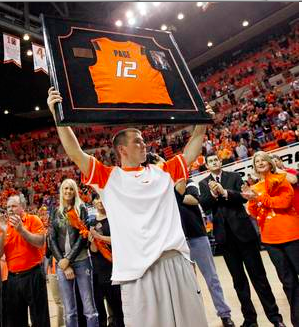
T.J. Franklin and Keiton Page played their last games in Kansas City, Mo. (Photos by Oklahoma Sooners and NewsOK.com)
From a statistical standpoint, Keiton Page and T.J. Franklin could not possibly be any different. At the same time, they could not possibly be more alike. They are two seniors beloved by their teammates and coaches. They are two seniors considered within their respective programs as unquestioned leaders, guys who always say and do the right thing. They are two seniors who represent the best of college athletics.
This is not a story just about a household name and a walk-on. It is a story about two seniors who saw their careers end in the span of 24 hours in Kansas City, Missouri. A story about what it’s like to pour your entire life into one sport and see it all evaporate in the matter of two hours. A story about how Page and Franklin are entirely different and yet entirely the same.
THE STAR
After a quarterfinal loss to Missouri in the quarterfinal round of the 2012 Big 12 Tournament, Keiton Page walks onto the podium at the postgame press conference with a dejected look in his eye. With his coach and two teammates surrounding him on both sides, several reporters fire questions at Page about his decorated career at Oklahoma State. They ask his coach to sum up his legacy as a Cowboy, and they ask his teammates to reflect on his indelible impact on the program. “A guy like Keiton,” roommate Markel Brown says, “I don’t think there will ever be another one.”
With the bright lights of the television cameras still shining brightly on the podium, the reporters continue to fire away. They ask Travis Ford how he felt when Page walked off the court for the last time to a standing ovation. They keep his head coach at the podium for more than 10 minutes, eagerly listening as Ford gushes about his team’s leading scorer and most recognizable player. The nation has watched Keiton Page play on national television for four years, and they want to know everything about him. “I can’t go anywhere in the United States without someone commenting to me, ‘Boy, I loved that Keiton Page,’” Ford says. “And I told them so do I. So do I.”
Page has heard his fair share of criticism over the years. He’s a volume shooter, they say. An overrated, 5’9″, baby-faced three-point specialist who lacks the athleticism to excel in the Big 12 and makes up for it by taking — and missing — a lot of three-pointers. Certainly there is some truth to the criticism. Page never broke 40% from three-point range in any of his four years at Oklahoma State, a mark which often measures the effectiveness of a long-range shooter. He is not particularly explosive or fast in the open court, and he does not have all of the natural point guard skills to direct a team. As a shooting guard much of his career, Page was undersized and sometimes overmatched.
Yet even with pedestrian shooting percentages, Page’s mark on the OSU program is undeniable. For all of his off nights in the scoring department, Page still always had the ability to take over a basketball game. That’s what he did at Pawnee High School when he scored 61 points in a game against Frontier. And that’s what he did at Oklahoma State on February 18, when he scored 40 points against Texas in a 12-point victory. As a senior, Page averaged 17.1 points per game, good for a spot on the All-Big 12 Second Team. In his final collegiate game against Missouri, he scored a team-high 22 points, though the 88-70 loss capped his team’s 15-18 season. It was the first losing season Page had ever experienced as a member of the Cowboys, but don’t blame him. Amid mass transfers and injuries, Ford said Page acted as the “grandfather” of this team. “I can’t overstate the leadership Keiton Page showed these young guys,” Ford said. “It’s phenomenal. It’s the best I’ve ever seen. Ever seen.”
The personnel issues placed quite a burden on Page. He shifted to the point after Reger Dowell and Fred Gulley transferred before Big 12 play, and he expanded his role further when hyper-athletic wing J.P. Olukemi tore his knee and missed the rest of the season. Page still shot just 41.5% from the field, and he experienced his share of 2-9 and 1-8 nights from three-point range. Through all of that, however, he also embraced his role as Grandfather Page, the short kid raised on OSU orange in the small town of Pawnee, Okla., a town of a few thousand in the north central portion of the state. “Coming from a guy that’s wanted to be a Cowboy since he was little,” Page said, “It’s been the best.”
THE WALK-ON
After a first-round loss in the Wednesday round of the 2012 Big 12 Tournament, T.J. Franklin leans forward in his chair in the Oklahoma locker room, resting his elbows on his thighs and his two hands on his chin. The reporters are talking to his teammates: the point guard, the leading scorer and the leading rebounder — everybody who played in the game and made a significant impact. But they are not talking to Franklin because he only played for 21.2 seconds, most of which Texas A&M wasted by dribbling aimlessly around in order to not run up the score.
So he sits patiently in the corner of the locker room, until he acknowledges you approaching him slowly. As you walk toward him, his ears and eyes perk up. He has a friendly face, a face that welcomes you and encourages you to talk to him. Despite his 5’11” frame, you notice that he has fairly massive biceps for his body type, a clear sign he is no stranger to hard work in the gym. When you ask him for a few minutes of his time, he nods his head. He does not smile because he is not happy, not less than a half-hour after the sport he worked so hard and so long for transformed into just a memory in an instant. But he does not frown, either, because he is polite, engaging and dependable. As you ask him questions about his career, he answers with honesty, clarity and charisma, even wryly smiling every so often.
As you, the lone reporter talking to T.J. Franklin, walk away and out of the locker room, that starting point guard who garnered so much media attention just minutes earlier named Sam Grooms directs a short, yet eloquent and fitting compliment toward his senior in the folding chair. “Good job, T.J.,” Grooms says.
Later, when you ask coach Lon Kruger to describe Franklin’s contributions, he gives a longer answer. “He’s a guy that only cares about the program and whatever he can do to help his teammates get better every day,” Kruger said. “A guy that’s been there consistently from the start, with a very positive outlook and a lot of energy.”
The humble Fort Worth, Texas, native describes himself in the same manner. He’s all about the other guys. In 17 games this season, he scored just seven points. He made the first and last three-pointer of his career in an 18-point loss to last-place Texas Tech in February, and he totaled a career-high nine minutes in a 29-point victory over Sacramento State in early December. He plays a unique role for the Sooners, however. Although teammates Barry Honore and C.J. Washington are also seniors, only Franklin has been around for all four years. As a freshman, he sat on the bench and watched Blake Griffin lead his team to an Elite Eight under coach Jeff Capel. Since then, he’s suffered through Capel’s firing and three losing seasons, culminating in a 15-16 effort in 2011-12. “I’ve seen it all in my four years here,” Franklin says. “Pretty much everything. It’s been a great ride.”
Through the coaching transition to Kruger and all of the losing, he knows his role is not visible to the public eye. But that doesn’t make him any less confident in his impact on his teammates. “I just try to set an example and show the younger guys how to compete, how to work in the weight room and in practice,” Franklin says. “That’s my job.”
THE STAR’S LAST STAND
Keiton Page’s team trails by 22 points to Missouri, the second seed in the Big 12 Tournament and the fifth-best team in America according to the polls. There are 15 minutes and 12 seconds remaining in his career. The Tigers have hardly missed on this particular night, and their lightning-quick point guard Phil Pressey has deflected seemingly every single ball thrown his way. They look faster and stronger in every way than the Cowboys, who are playing without two of their key contributors — the injured Le’Bryan Nash and Philip Jurick. Ford is using a seven-man rotation, which includes former walk-on Christien Sager.
After the teams break their huddles and take the floor for more action, Missouri continues to roar. Marcus Denmon, a fellow senior and All-Big 12 First Team guard, scores 13 points in a two-minute span. The Tigers lead by 29 points. Twelve minutes and 25 seconds left in his career. Denmon throws down a dunk in transition. He makes another layup on the next possession. Playing in his hometown of Kansas City, Denmon has scored 17 of his team’s last 19 points. Missouri leads 74-45. On the next possession, Missouri’s Steve Moore blocks a shot near the free throw line, which inadvertently falls into Page’s hands from well beyond the arc. He does what he has done for four years straight.
He shoots it. It goes in this time. Ford calls a timeout, and just like that, Keiton Page has been unleashed. There are nine minutes and 53 seconds left in his career, but he will not go down without putting on a show. Two minutes later, Page tips a dribble by Michael Dixon into the hands of his teammate. A fastbreak is upon us. His teammate delivers him the ball, and suddenly he has a two-on-one against Kim English. Instead of passing, Page pulls up from the right wing, just behind the arc. Swish. Eight minutes and three seconds remaining in his career.
He’s still losing by 19 points. It’s starting to set in that Keiton Page will never, ever play basketball for Oklahoma State again. Caught in the moment, Page doesn’t let any emotion show. He continues to battle like he has for 4,322 minutes during his career. By the time the game is finished, he will have played 259,320 seconds of college basketball in a Cowboy uniform, and he’s making them all count in this game.
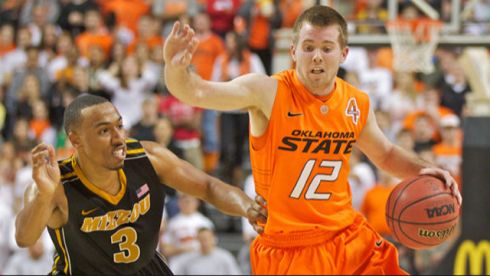
“After Watching Someone On Film For Four Years, You Feel Like You Get To Know Someone. He’s A Special Player” - Missouri standout guard Kim English on Page
His teammate commits an over-and-back violation. Page pleads with the officials, to no avail. Two minutes and one second remaining in his career. Page dribbles the ball at the top of the key. The man they say can only shoot threes takes Kim English off the bounce, crossing him over to his left and driving all the way to the middle of the paint. Just before he runs into Moore, who rotated over to help on the drive, Page swings the ball to Marek Soucek. Layup good. It’s the last assist Page will ever tally as an Oklahoma State Cowboy.
One minute and 30 seconds left in his career. Page’s teammate draws a charge, which gives the Cowboys possession trailing by 18 points. Markel Brown runs the point and passes to Page, who passes back to Brown. Page runs to the right wing. Brown finds him again. Page has a wide-eyed look in his face. He has the ball behind the three-point arc and he wants this shot. He rises in front of two leaping defenders for his last shot attempt as an Oklahoma State Cowboy. As he lands to the floor, he watches the basketball soar toward the basket. It bounces off the top of the rim and high into air, a perfect placement for the high-flying Brian Williams to slam home an emphatic dunk. Williams will probably watch that dunk on YouTube later. Next year, when he’s a sophomore, he will probably try to attempt an even better dunk.
There is no next year for Keiton Page. He misfired on his last shot as a Cowboy, but even then, Grandfather Page’s shot lead to a highlight for a teammate. Exactly one minute remaining in Page’s career. As he guards MU walk-on Jarrett Sutton, a driving Dixon spurts past one of his teammates. Like he’s done over and over again, Page instinctively shifts his feet and darts his hands at the basketball. The ball flies out of bounds, and the referees say Missouri touched it last. Fifty-three seconds remaining in his career. That loud horn at the Sprint Center suddenly blows after the stoppage, signifying a substitution. Cezar Guerrero is coming into the game.
Keiton Page is coming out. There are 53 seconds remaining in his career, but Keiton Page will watch them from the bench. As he walks toward Ford, all 18,972 people in the building stand and clap at once. The people in orange are clapping. The people in black and gold are clapping. Everyone is clapping, even Kim English.“After watching someone on film for four years, you feel like you get to know someone,” English says after the game. “He’s a special player.” After a long hug with Ford, Page individually embraces each teammate and member of the OSU coaching staff on the bench. The applause never stops because the building recognizes this magnitude of this moment.
Everyone knows Page’s story. They know about his scoring outbursts at tiny Pawnee High School and his childhood love for the Cowboys. They have seen him play on ESPN, they have seen him on SportsCenter and they have heard the jokes about how he looks more like a water boy and less like an All-Conference basketball player. Page finishes with 22 points: 8-16 from the field, 6-12 from three-point land. Exactly 50%. When he finally settles into his seat next to the coaching staff on the bench, there are no tears for Page. He watches the rest of the game as if he’s taking a quick breather, ready to re-enter whenever Ford tells him to.
The buzzer sounds after Missouri runs out the clock, and Grandfather Page immediately runs to the front of the handshake line. Nobody questions this move because there is nothing to question: Keiton Page is the heart and soul, the everything for Oklahoma State basketball. He shakes hands with the Tigers and trots off to the locker room. 4,322 minutes after he started, Page’s career ends with an 18-point loss to one of the best teams in the nation. “It’s going to be tough,” Page said. “To play with great teammates and then put in a great opportunity under this coaching staff … just a million memories I’ll never forget.”
THE WALK-ON’S LAST STAND
There are four minutes and 31 seconds remaining in T.J. Franklin’s career. His Oklahoma team trails by just two points to ninth-seeded Texas A&M in the opening round, and the game is very much winnable at this point. Romero Osby has just made two free throws, and the thin crowd comes alive in support of the Sooners. Franklin sits on the bench, in the first spot next to the assistant coaches. He never plays, but that is his spot. Nobody would dare take it. At the other end of the floor, another senior is fighting for his life with Texas A&M. Dash Harris pulls up from the right wing. He needs this shot to go in. He doesn’t want his career to end on Wednesday night of the Big 12 Tournament, either. The shot falls. The crowd roars. And Harris throws up three fingers toward his bench, as if they didn’t know he made a three-point shot. Franklin doesn’t flinch. His expression never changes, and his face always looks the same as he sits patiently on the bench. He won’t have an impact on how this game plays out on the court, but his influence is always lurking.
Three minutes and 42 seconds remaining in his career. Andrew Fitzgerald misses a shot, and it’s rebounded by Ray Turner. Another senior, David Loubeau, scores at the other end for the Aggies. A minute later, junior Khris Middleton fires a three from the left corner. It’s a line drove shot, the way he always does it, and it swishes. Three players on the A&M bench hold up that patented three-finger sign. That’s the ballgame. Aggies lead by eight, and with the way Oklahoma is playing offensively, there is practically no chance of a comeback. Kruger calls a timeout. Franklin leaps up from the bench. One minute and 43 seconds remaining in his career.
Out of the timeout, Cameron Clark grabs an offensive rebound and draws a foul. He misses both free throws, dropping to 66.7 percent on the year. He may have only made two-thirds of his shots from the charity stripe, but during the off-season before his junior year, he’ll have a lot of time to work on that area of his game. Franklin doesn’t have an off-season. He’s living and dying with this year’s team, and right now, he’s dying. Oklahoma trails by eight and the clock is ticking. Thirty seconds remaining in Franklin’s career. He’s still sitting on the bench. Helpless. Elston Turner makes two free throws for A&M, extending the lead to 10 points. On the next possession, a foul puts Loubeau on the free throw line. There are 21.2 seconds remaining in Franklin’s career. Suddenly, Kruger motions to the bench. “For Oklahoma, T.J. Franklin replaces C.J. Washington,” the public address announcer bellows. This is the 57th time a PA announcer has said that. It will never happen again.
Nobody notices. A few Oklahoma fans clap, but there aren’t many Sooners supporters in the building. Franklin jogs eagerly on to the court and into his spot in the lane. Loubeau misses his first free throw. No reaction from Franklin. Loubeau makes his second, and Franklin runs to the other end of the floor and into the left corner. As Osby dashes toward the rim, he plows over a defender. The referees say it’s a blocking foul on the Aggies, and Franklin speeds over to encourage his teammate. He slaps hands with Osby, as if his career weren’t about to end in 13.7 seconds.
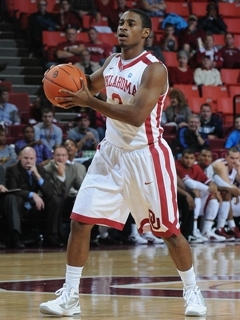
Although He Didn't See The Court Often, T.J. Franklin Represents Everything About What A Student-Athlete Should Be About
Osby makes them both. Franklin slaps his hand again. When Texas A&M inbounds the ball, Franklin guards Dash Harris, but only out of principle. The game is over, and all Harris must do is dribble the ball a few times until the buzzer sounds. When it does, Franklin embraces Harris, who survived to play one more game in the quarterfinals. Harris’ career would end in less than 24 hours. Franklin wishes he had another 24 hours, but he’s content with the 21.2 seconds he got. “It was really special,” Franklin says later. “It just shows you everything you need to know about this coaching staff and how much they care.” As always, he hustles off the court and into the locker room. He is the first Oklahoma player to enter the tunnel. As he disappears into the bowels of the Sprint Center, he leaves four years of memories behind him.
THE FINALE
Keiton Page and T.J. Franklin played each other 10 times in the Bedlam Series, the name used to describe the rivalry between Oklahoma State and Oklahoma. Page played in all 10 contests. In the first Bedlam game of his career, Page scored 15 points and made a trio of three-pointers, nearly resulting in a major upset of the fourth-ranked Sooners. After announcing his arrival to the rivalry, he entered OSU’s starting lineup late in the season and eventually started both the final regular-season game against OU and the conference tournament game in March. From then on, Page would start every single game of his career for more than three years, save for three contests.
Franklin appeared in only three Bedlam games, two of which came in 2010. He logged six minutes on Feb. 13, 2010 in Stillwater, a game the Cowboys won by 21 points. Keiton Page scored 25 points in that game, a career-high at the time. Franklin didn’t attempt a shot. When the two players faced each other for the final time this year, Oklahoma broke a six-game Bedlam losing streak with a 77-64 win. Page made nine three-pointers. Franklin didn’t play. And yet the Sooners still earned bragging rights, perhaps through the power of T.J. Franklin, the walk-on with the chiseled arms and the friendly face — the man who calmly leads this Oklahoma team without hardly playing a minute of basketball. He will graduate this spring from a roster that looks to have a bright future under Kruger, an established coach with several NCAA Tournament appearances to his name at a variety of schools. The Sooners will bring back all five starters, including Grooms, leading scorer Steven Pledger and forwards Romero Osby and Andrew Fitzgerald. “I definitely care about the future of this program,” Franklin said. “I know the coaching staff will get it done.”
Keiton Page might be a part of his Oklahoma State coaching staff next year. Ford said he has expressed interest in joining the coaching profession. “If he doesn’t get drafted in the first round or something,” Ford jokes, “He knows he has a place on my staff anytime he wants it.” Still, it’s not the same. For all the points Page scored and all the minutes Franklin did not play, they both share a passion: a driving, all-consuming passion to win. Both experienced the highs of team success at one point or another: Page made two NCAA Tournaments as a freshman and sophomore, and Franklin’s first year resulted in an Elite Eight in 2009.
This year, Oklahoma and Oklahoma State tanked. By the end of the Big 12 Tournament quarterfinals, Page and Franklin’s collegiate careers had ended, since no postseason tournament would ever touch either sub-.500 team. As the only four-year players on their respective teams, though, there were no tears from Page or Franklin because there was nothing to cry about. “These guys made it easier this year,” Page said after his final victory in the first round against Texas Tech. “They’ve had their heads up the entire way, always keeping their heads up, always wanting to work harder the next day. Just battling and just fighting to keep this thing alive.”
It died the next day for Page, exactly a day longer than Franklin’s career survived. Still, as Franklin sits in that chair in the corner of the Oklahoma locker room, he doesn’t wallow in pity about playing his final game. Instead, he tells you about how he tried to prepare his team for a tournament setting. He tells you how he’s been here four times now, and how as a senior, he knows how conference tournaments work better than anybody. “I know we lost,” Franklin says, “but I just really wanted to try to get these guys ready for what they’d face here in Kansas City.”
Spoken like a true senior.





























